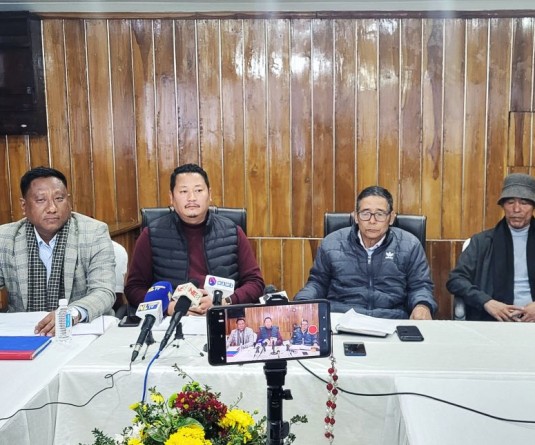
‘Two-step process for integration’: Muivah
DIMAPUR, OCT 11 (MExN): Union Minister of State for Statistics & Program Implementation Oscar Fernandes, who is also Head of the Group of Minister (GoP) in the Indo-Naga political talks, has described as “positive” the proposal of Thuingaleng Muivah, General Secretary of the National Socialist Council of Nagalim (Isak-Muivah), for forging a close relationship with India in a step-by-step manner.
According to a news-report carried in the October 11 issue of The Telegraph, after the first round of peace talks on Monday, Muivah had said that the hurt feelings of the Nagas, upset about the tardy progress of the peace process and repeated ceasefire violations, had been assuaged to some extent with two overtures from Prime Minister Manmohan Singh.
Fernandes, who had met the Prime Minister before leaving for Bangkok, is reported to have told Muivah that Singh was also upset with reports of an alleged encounter killing of NSCN cadre in Shillong last week and had asked Fernandes himself to ascertain the facts personally.
More importantly, Fernandes told Muivah that the Prime Minister had “categorically” stated that the government recognised the “unique” history of the Nagas and wanted to seek a peaceful and honourable solution on that basis.
An obviously pleased Muivah said: “This is the first time that a Congress-led government has said this. Till now they had kept mum on this subject. So this is a positive sign.”
Muivah described Monday’s talks as “cordial and sincere” and added, “As long as there is determination to go forward we can hope to make progress.”
He felt that the proposal for a close federation with India, addressing India’s security concerns and a two-step process for the integration of Naga areas “cannot be objected to” by the Government of India.
The NSCN (I-M) delegation presented a list of incidents of ceasefire violations; the Shillong incident was also discussed, with the Nagas providing pictorial evidence to support their allegation of torture and custodial killing.
Muivah apparently told the Indian delegation that it had become “very difficult to heal the wounds of the Nagas caused by “the brutal behaviour of the Indian security forces” and that “this limited my freedom to negotiate a peaceful settlement”. The Indian side seems to have appreciated his difficulty.
About the Naga resentment at ceasefire violation, Fernandes admitted that the NSCN (I-M) had raised some “very serious concerns”. He said: “They have brought to our notice certain instances of ceasefire violations and we will go into them in detail. The pictures they have provided us about the Shillong incident in particular can only help us in ascertaining the facts.”
Fernandes seemed to agree that ceasefire violations occurred because of poor co-ordination between a multiplicity of state and central agencies and security forces. However, he said: “India is a vast country and there are different agencies there. We do our best to co-ordinate their activities.”
“We believe that they have understood the seriousness of the situation both politically and militarily. We also believe that this would result in their being more serious in dealing with future issues and situations. They know that without this the political talks cannot proceed,” Muivah is reported to have said.





